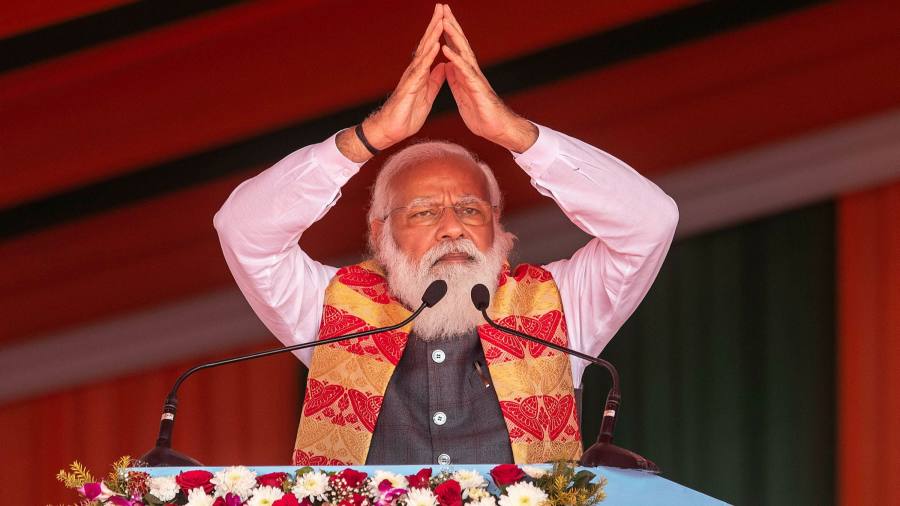[ad_1]
As England’s batsmen succumbed to India’s spin attack on the opening day of their cricket Test match, another Indian loomed even larger over the game, despite not bowling a single ball: Narendra Modi.
Indian politicians have long been deeply involved in cricket, basking in the money, power and glory of the country’s most popular pastime — to the dismay of purists who argue political meddling has held back the sport.
Modi, however, has taken India’s cricket politics to new heights. India and England played in Ahmedabad, his political hometown, at a newly rebuilt cricket stadium — the world’s largest — that was renamed for the prime minister shortly before Wednesday’s match.
To some observers, the grip of Modi and his Bharatiya Janata party over Indian cricket symbolises how they are remaking the country’s political and economic order.
“The stadium itself — the name, the way it has been funded, and the people who run Gujarat cricket as a state body — says a lot about the power structure in contemporary India under the BJP,†said Ronojoy Sen, senior research fellow at the National University of Singapore and author of a history of Indian sports.
The more than 100,000-seat ground was conceived when Modi ran the state-level Gujarat Cricket Association, before his ascent into national politics. His right-hand man Amit Shah, now home minister, became president of the body.
Stands at the ground, built for an estimated Rs8bn ($110m), were named after Mukesh Ambani’s Reliance Industries and Gautam Adani’s eponymous group, India’s two most powerful tycoons with deep ties to the prime minister.
Shah’s son Jay is secretary of the Board of Control for Cricket in India, the richest and most powerful cricket board in the world, while a father-son duo of Reliance executives has more recently helped lead the Gujarat association.
For Modi’s supporters, the stadium highlights an ambitious leader’s ability to deliver world-class infrastructure that will help India shine globally.
But for his opponents, it encapsulates what they decry as a nexus between the prime minister and his lieutenants and favoured tycoons, whose collective influence over India’s political and economic system has been hotly debated.
“Beautiful how the truth reveals itself,†Rahul Gandhi, a leader of the opposition Congress party, wrote on Twitter. “Narendra Modi stadium/Adani end/Reliance end/With Jay Shah presiding.â€
Indian leaders long flocked to cricket for its universal appeal — its popularity transcending regional, caste or religious divides — as well as for the ample opportunities for patronage. While early Hindu nationalist ideologues of the Rashtriya Swayamsevak Sangh, the BJP’s parent organisation, decried cricket as a colonial import, later generations of leaders such as Modi and Shah have embraced it.
“Cricket is a cocktail of money, power and influence — even Bollywood,†said Mahesh Langa, a journalist for the Hindu newspaper in Ahmedabad.
The persistent involvement of politicians in local and national cricket bodies has stoked allegations of mismanagement and graft. As far back as 1959, legendary batsman Vijay Merchant bemoaned that “there is a lot of politics in our cricketâ€, according to Ronojoy Sen’s book, Nation at Play.
This has sparked reform drives, with limited success. In 2017, the Supreme Court overhauled the management of the BCCI to impose term limits and bar ministers from holding positions. Some of the reforms are being challenged in court.
Observers have questioned the will of the country’s leaders to maintain distance from the sport, especially with its rapid commercialisation, most notably after the Indian Premier League’s 2008 launch sparked an unprecedented windfall.
“The involvement of politics in cricket is very strong and getting stronger,†said Ayaz Memon, a sports writer and commentator. “It’s an axis into a massive sport which in the last 30 years has become phenomenally rich.â€
Vinod Rai, a former auditor-general who was appointed to the BCCI by the Supreme Court to implement its recommendations, said: “It’s very few places where it’s not politicians who are controlling these institutions.â€
He added that Modi and Shah, unlike many others, had at least managed to get things done. “A fine international stadium having been constructed is a huge feather in the cap,†he said.
The Motera stadium, as it was commonly known, was originally built in 1983 when the Congress party ruled Gujarat.
In 2009, Modi, then Gujarat’s chief minister, was elected to run the state’s cricket association, wresting control from Congress in a move that foreshadowed his triumph in national polls five years later.Â
It was then that he set in motion plans to rebuild the stadium, which reopened to the public last year when former US president Donald Trump visited India. It hosted its first match against England this week.
That Ahmedabad, long-overlooked as a cricketing hub, is now on the global circuit alongside Mumbai, Sydney or London is a testament to what Modi’s supporters maintain is his transformative vision and execution.
Others said it highlighted how the prime minister has concentrated India’s power structures around himself and close allies — from centralised government policymaking to the extensive use of his image to promote welfare schemes or sports.
Sandeep Dwivedi, a columnist for the Indian Express, wrote that the centre of Indian cricket had shifted “from Mumbai to Motera . . . not even a blade of grass got trimmed in Indian cricket without the mandatory call to Ahmedabadâ€.
For Modi’s loyal base in Gujarat, this shift is long overdue.
Aditya Mehta, a 22-year-old masters student in biotechnology, said outside the ground: “Our prime minister and home minister have built the world’s largest cricket ground, and now every match possible can happen in this stadium.â€
[ad_2]
Source link







